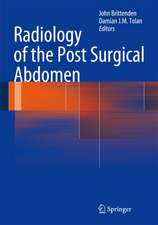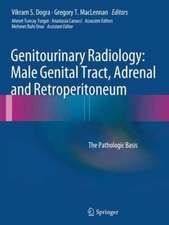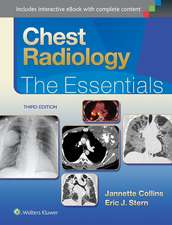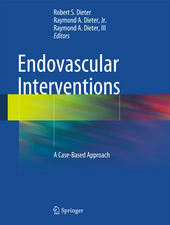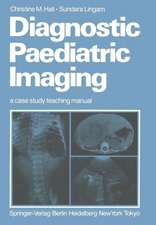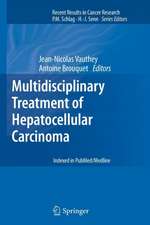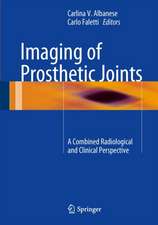Venous Embolization of the Liver: Radiologic and Surgical Practice
Editat de David C. Madoff, Masatoshi Makuuchi, Masato Nagino, Jean-Nicolas` Vautheyen Limba Engleză Paperback – 28 noi 2014
The practice of venous embolization of the liver was originally developed in Japan by Dr. Makuuchi (one of the co-editors of this book) in 1990 and since then, the techniques reviewed in this book are practiced throughout the world and are now considered the “standard of care” at many hepatobiliary centres worldwide.
Venous Embolization of the Liver: Radiologic and Surgical Practice covers a multitude of topics, including: pertinent vascular (microscopic and macroscopic) and surgical anatomy, liver regeneration (including the atrophy-hypertrophy complex), historical perspectives of major hepatic resection, various hepatobiliary surgical procedures , factors affecting hypertrophy, pathophysiology of embolization and resection, embolization techniques (including approaches and embolic agents), the indications for embolization and resection (including pre-operative volumetric and functional assessment and post-embolization followup), potential complications, outcomes data for different diseases, recently advocated strategies (including “definitive” treatment of hepatocellular carcinoma using portal vein embolization after transcatheter arterial chemoembolization) and future perspectives.
This book is a valuable resource for interventional radiologists and hepatobiliary surgeons who perform the embolization procedures and liver resections. Venous Embolization of the Liver: Radiologic and Surgical Practice can also be used secondarily by diagnostic radiologists, medical oncologists specializing in gastrointestinal malignancies, hepatologists, gastroenterologists, liver transplant surgeons and basic scientists interested in liver regeneration physiology research.
| Toate formatele și edițiile | Preț | Express |
|---|---|---|
| Paperback (1) | 728.93 lei 38-44 zile | |
| SPRINGER LONDON – 28 noi 2014 | 728.93 lei 38-44 zile | |
| Hardback (1) | 987.22 lei 38-44 zile | |
| SPRINGER LONDON – 28 iul 2011 | 987.22 lei 38-44 zile |
Preț: 728.93 lei
Preț vechi: 767.30 lei
-5% Recomandat Nou
Puncte Express: 1093
Preț estimativ în valută:
139.50€ • 145.10$ • 115.16£
139.50€ • 145.10$ • 115.16£
Carte tipărită la comandă
Livrare economică 11-17 aprilie
Preluare comenzi: 021 569.72.76
Specificații
ISBN-13: 9781447159506
ISBN-10: 1447159500
Pagini: 340
Ilustrații: XVI, 322 p.
Dimensiuni: 193 x 260 x 18 mm
Ediția:2011
Editura: SPRINGER LONDON
Colecția Springer
Locul publicării:London, United Kingdom
ISBN-10: 1447159500
Pagini: 340
Ilustrații: XVI, 322 p.
Dimensiuni: 193 x 260 x 18 mm
Ediția:2011
Editura: SPRINGER LONDON
Colecția Springer
Locul publicării:London, United Kingdom
Public țintă
Professional/practitionerCuprins
History and Anatomy.- History of Major Liver Resections.- Microcirculation of the Liver.- Portal and Hepatic Vein Anatomy.- Surgical Anatomy of the Liver in the Glissonean Pedicle Approach: What We Need to Know.- Liver Anatomy: Variant Venous Anatomy and Implications for Resection.- Liver Regeneration and the Atrophy-Hypertrophy Complex.- Preoperative Assessment.- Preoperative Imaging of Liver Cancers: Hepatocellular Carcinoma.- Imaging of Hilar Cholangiocarcinoma.- Preoperative Imaging of Liver Cancer: Metastases.- CT Volumetry: Japanese Methodology.- Morphometric Imaging Techniques and the Functional Liver Remnant.- Preoperative Assessment with Functional Studies of the Liver.- Embolization Techniques.- Indications and Contraindications for Portal Vein Embolization.- Embolic Materials Used for Portal Vein Embolization.- Trans Ileocolic Portal Vein Embolization.- Contralateral Approach to Portal Vein Embolization.- The Ipsilateral Approach for Right PVE with or Without Segment 4.- Complications of Portal Vein Embolization.- Hepatic Vein Embolization.- Clinical Outcomes for Liver Metastases.- Clinical Outcomes for Biliary Tract Cancer.- Clinical Outcomes for Hepatocellular Carcinoma.- Nontraditional Resection Including the Two-Stage Hepatectomy.- Preoperative Portal Vein Embolization Strategy for Complex Liver Resection.- Sequential PVE and TAE for Biliary Tract Cancer and Liver Metastases.- Sequential TACE and PVE for Hepatocellular Carcinoma.- Evidence and the Future.- Chemotherapy and Its Effect on Liver Hypertrophy.- Tumor Growth After Embolization.- Portal Vein Embolization Prior to Major Hepatectomy: The Evidence.- Enhancing Hepatic Regeneration with Stem Cells and Portal Vein Embolization.- Future Perspectives.- Index.
Recenzii
From the reviews:
“This book provides a comprehensive review of not only the state of the art of portal vein embolisation but the whole process of assessing and bringing patients to resection. As such, from a radiological perspective it will be of interest to the diagnostic radiologist assessing for resectability and measuring liver volumes and the interventionalist performing the embolisation.” (Graham Munneke, RAD Magazine, April, 2013)
“Venous Embolization of the Liver fills a useful niche and provides a thorough review of venous embolization of the liver, especially as it relates to optimization of the results associated with partial hepatectomies. The abstract of each chapter of this well organized and in-depth work also provides the reader significant insight into the content of each chapter. Reading Venous Embolization of the Liver is a worthwhile endeavor for the interventional radiologist, hepatobiliary surgeon, or advanced trainee involved or interested in the treatment of hepatobiliary disease.” (Sean Kalagher, Journal of Vascular and Interventional Radiology, Vol. 24 (4), April, 2013)
“This book addresses a very important, practical and fascinating topic: how to manage patients affected by primary liver tumours or by secondary lesions due to primary colorectal cancer, utilizing venous embolization of the affected parenchyma. … This is a book that will be appreciated not only by interventional radiologists and hepatobiliary surgeons, but also by the broad audience of those dedicated to the treatment of liver diseases and to research in the field.” (G. Beluffi, La Radiologia Medica, Vol. 118 (2), March, 2013)
Venous Embolization of the Liver: Radiologic and Surgical Practice, has been Highly Commended in the Radiology category of the 2012 BMA Medical Book Awards
“This book provides a comprehensive review of not only the state of the art of portal vein embolisation but the whole process of assessing and bringing patients to resection. As such, from a radiological perspective it will be of interest to the diagnostic radiologist assessing for resectability and measuring liver volumes and the interventionalist performing the embolisation.” (Graham Munneke, RAD Magazine, April, 2013)
“Venous Embolization of the Liver fills a useful niche and provides a thorough review of venous embolization of the liver, especially as it relates to optimization of the results associated with partial hepatectomies. The abstract of each chapter of this well organized and in-depth work also provides the reader significant insight into the content of each chapter. Reading Venous Embolization of the Liver is a worthwhile endeavor for the interventional radiologist, hepatobiliary surgeon, or advanced trainee involved or interested in the treatment of hepatobiliary disease.” (Sean Kalagher, Journal of Vascular and Interventional Radiology, Vol. 24 (4), April, 2013)
“This book addresses a very important, practical and fascinating topic: how to manage patients affected by primary liver tumours or by secondary lesions due to primary colorectal cancer, utilizing venous embolization of the affected parenchyma. … This is a book that will be appreciated not only by interventional radiologists and hepatobiliary surgeons, but also by the broad audience of those dedicated to the treatment of liver diseases and to research in the field.” (G. Beluffi, La Radiologia Medica, Vol. 118 (2), March, 2013)
Venous Embolization of the Liver: Radiologic and Surgical Practice, has been Highly Commended in the Radiology category of the 2012 BMA Medical Book Awards
Textul de pe ultima copertă
Venous Embolization of the Liver: Radiologic and Surgical Practice explores the theoretical advantages and clinical implications for utilizing Venous Embolization techniques, including portal vein and hepatic vein embolization.
The practice of venous embolization of the liver was originally developed in Japan by Dr. Makuuchi (one of the co-editors of this book) in 1990 and since then, the techniques reviewed in this book are practiced throughout the world and are now considered the “standard of care” at many hepatobiliary centres worldwide.
Venous Embolization of the Liver: Radiologic and Surgical Practice covers a multitude of topics, including: pertinent vascular (microscopic and macroscopic) and surgical anatomy, liver regeneration (including the atrophy-hypertrophy complex), historical perspectives of major hepatic resection, various hepatobiliary surgical procedures , factors affecting hypertrophy, pathophysiology of embolization and resection, embolization techniques (including approaches and embolic agents), the indications for embolization and resection (including pre-operative volumetric and functional assessment and post-embolization followup), potential complications, outcomes data for different diseases, recently advocated strategies (including “definitive” treatment of hepatocellular carcinoma using portal vein embolization after transcatheter arterial chemoembolization) and future perspectives.
This book is a valuable resource for interventional radiologists and hepatobiliary surgeons who perform the embolization procedures and liver resections. Venous Embolization of the Liver: Radiologic and Surgical Practice can also be used secondarily by diagnostic radiologists, medical oncologists specializing in gastrointestinal malignancies, hepatologists, gastroenterologists, liver transplantsurgeons and basic scientists interested in liver regeneration physiology research.
The practice of venous embolization of the liver was originally developed in Japan by Dr. Makuuchi (one of the co-editors of this book) in 1990 and since then, the techniques reviewed in this book are practiced throughout the world and are now considered the “standard of care” at many hepatobiliary centres worldwide.
Venous Embolization of the Liver: Radiologic and Surgical Practice covers a multitude of topics, including: pertinent vascular (microscopic and macroscopic) and surgical anatomy, liver regeneration (including the atrophy-hypertrophy complex), historical perspectives of major hepatic resection, various hepatobiliary surgical procedures , factors affecting hypertrophy, pathophysiology of embolization and resection, embolization techniques (including approaches and embolic agents), the indications for embolization and resection (including pre-operative volumetric and functional assessment and post-embolization followup), potential complications, outcomes data for different diseases, recently advocated strategies (including “definitive” treatment of hepatocellular carcinoma using portal vein embolization after transcatheter arterial chemoembolization) and future perspectives.
This book is a valuable resource for interventional radiologists and hepatobiliary surgeons who perform the embolization procedures and liver resections. Venous Embolization of the Liver: Radiologic and Surgical Practice can also be used secondarily by diagnostic radiologists, medical oncologists specializing in gastrointestinal malignancies, hepatologists, gastroenterologists, liver transplantsurgeons and basic scientists interested in liver regeneration physiology research.
Caracteristici
Many detailed illustrations of liver segmental and vascular anatomy and embolization techniques State-of-the-art imaging and intraoperative photography will be used to highlight these innovative techniques Graphs and tables will be used to provide detailed outcome data for comparisons of various embolic agents and techniques as well as survival outcomes for various hepatobiliary diseases for which venous embolization will be utilized. Includes supplementary material: sn.pub/extras





